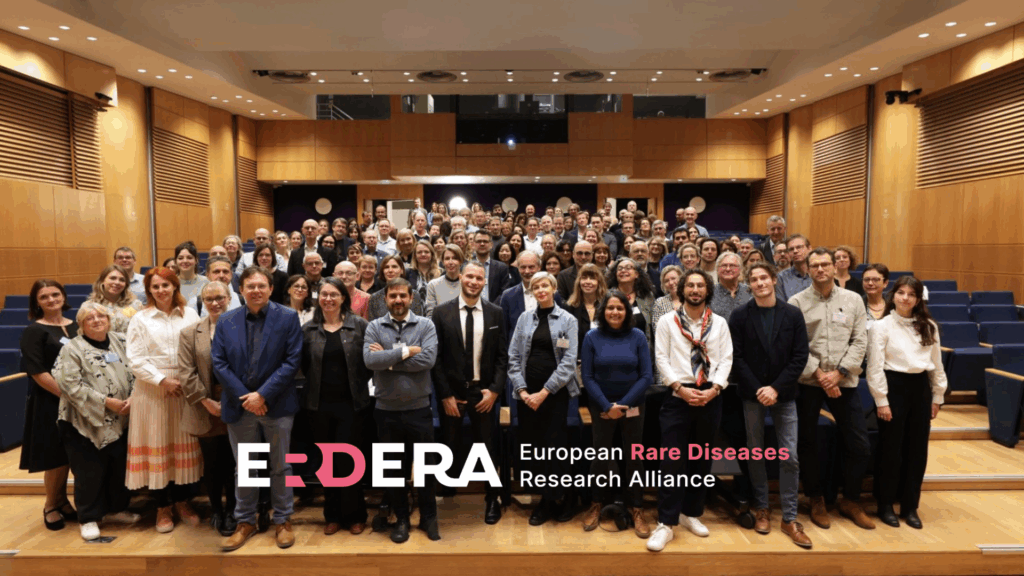Nearly 600 people followed ERDERA opening ceremony either online or in person in central Paris on 28 October. We summarise next some highlights from the speakers who took the floor during the event that marked the start of a new era in rare disease research.
Nacer Boubena, Scientific Director, Head of the Biology and Health Department (French Ministry of Higher Education and Research) highlighted the critical role of ERDERA in structuring the ecosystem to benefit patients: “ERDERA enables collaboration across diverse areas, ranging from research to innovation in diagnosis and care”.
Anne-Sophie Lapointe, Head of Rare Disease Mission, Department to the Director General of Healthcare Provision (DGOS) remined participants that capacity building is essential for creating sustainable networks that can handle technological challenges effectively while participating in new scientific developments. “We possess the knowledge and tools to change the lives of millions affected by rare diseases. Let us commit today to shaping a future where no one is left behind”
Irene Norstedt, Director, People Directorate DG RTD, European Commission stressed the commitment of the EU with advancing rare disease research. “Proof of this is the substantial investment in rare diseases research that we have done over the last 20 years through the several successive EU research framework programmes. We have invested more than €3 billion in collaborative research. This has translated into better diagnosis and to the development of several new orphan medicines”.
Arjon van Hengel, Deputy Head of Unit for Health Innovations & Ecosystems at the European Commission, noted that ERDERA’s efforts could greatly progress health research in rare diseases and other fields by pioneering new approaches. Van Hengel focused on the role of industry in this new partnership to help translate early-stages research to solutions that can reach the patients. He also underlined the importance of data integration and research infrastructures: “Key to ERDERA’s success are the 24 European Reference Networks (ERNs) and their valuable clinical expertise”.
Arjon van Hengel, (European Comimission):“Key to ERDERA’s success are the 24 European Reference Networks (ERNs) and their valuable clinical expertise”.
Virginie Bros-Facer, CEO, EURORDIS referred to the opportunity ERDERA brings to address fragmentation in clinical research and highlighted how patient driven approach is embedded in every aspect of ERDERA from setting research policy to actively involving patients’ organisation: “This represents a new chapter in our collective journey, promising to accelerate research and translate scientific discovery into tangible solutions for patients. The strength of ERDERA lies in its comprehensive and inclusive approach, uniting researchers, clinicians, industry partners and most importantly, patients”.
Bros-Facer also referred to the National Mirror Groups (NMGs) and their critical role in engaging national stakeholders and aligning country specific actions with European initiatives: “These will play a crucial role in empowering national alliances, particularly in underrepresented countries, to influence research and policy development at both national and European levels by fostering collaboration and knowledge sharing across borders with the aim of creating a more equitable, equitable landscape for rare disease research and innovation across Europe”.
Virginie Bros-Facer (EURORDIS): “The strength of ERDERA lies in its comprehensive and inclusive approach, uniting researchers, clinicians, industry partners and most importantly, patients”.
Guillaume Canaud, Hôpital Necker-Enfants Malades AP-HP, France offered an inspiring keynote “From a single patient to a US FDA approved drug: the story of a drug repositioning for a rare disease”. During his talk, Canaud, a French nephrologist shared his personal journey to repurpose a molecule originally developed against breast cancer to treat overgrowth syndromes, a rare and often debilitating disease.
James Levine, President, Fondation Ipsen offered a keynote on “De-Risking and Funding Strategies in Rare Diseases”. Levine explained that there’s a better understanding of the molecular basis of these diseases, awareness of therapeutic platforms’ potential impact, and strong regulatory and economic incentives driving progress. He referred to challenges, de-risking mechanisms, and innovative funding models and referred to the role of patients: “Patient associations are absolutely critical in rare diseases, but so are links with academia, industry and regulatory bodies”.
Daria Julkowska, ERDERA coordinator, INSERM (France) closed the event with an overview of the new partnership vision, mission and activities. In an inspirational speech “Turning the Rare into Reality: A Bold Vision for Hidden Lives”, Julkowska described ERDERA as a house built on solid foundations which will enable:
- robust funding opportunities to support multinational research projects, clinical studies, and networking activities;
- in house clinical research, encompassing a European Clinical Research network ready to partner with public and private stakeholders to develop top level science and innovation and to accelerate solutions for rare diseases
- Mentoring and training
Daria Julkowska (INSERM): “Help us empower rare by making disease concrete and measurable”.
Julkoswla closed ERDERA official ceremony with a call to society at large: “Help us by raising awareness about rare diseases, showing that these conditions are more common than people realise”. But she also appealed directly to researchers, policy makers and industry leaders: “If you are a researcher or a young person choosing your scientific or medical pathway, think about how impactful your research could be. Your innovative ideas could help improve the lives of the over 30 million people in Europe living with a rare disease. If you are a policy maker, think about how supporting rare diseases contributes to the values that you support on a daily basis, like justice equity, solidarity and brotherhood. Help us empower rare by making disease concrete and measurable”.

